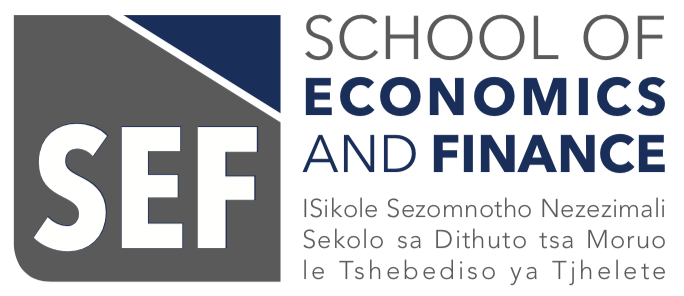 |
SEF’s research in Human Development and Wellbeing is especially distinguished by its focus on gender dynamics. Scholars investigate gender disparities in employment, earnings, wealth, poverty, health, and wellbeing - with a strong emphasis on post-COVID shifts.
This research extends to household and family structures, analysing how resources, care, and wellbeing are distributed within homes, as well as trends in household composition, maternal and child nutrition, and early childhood development.
|
Publication Examples:
Badaoui, E., Bargain, O., Kwenda-Magejo, P., Strobl, E., & Walsh, F. 2024. Informality, self-employment and heterogeneous managerial ability: A model for developing countries. Journal of International Development, 36(2):1293-1323.
Casale, D. & Oyenubi, A. 2024. Measuring the gender wealth gap in South Africa using individual-level data. South African Journal of Economics, 92(1):80-92.
Desmond, C., Watt, K., Naicker, S., Behrman, J., & Richter, L. 2024. Girls' schooling is important but insufficient to promote equality for boys and girls in childhood and across the life course. Development Policy Review, 42(1):e12738.
Desmond, C., Watt, K., Rudgard, W.E., Sherr, L., & Cluver, L. 2024. Whole of government approaches to accelerate adolescent success: efficiency and financing considerations. Health Policy and Planning, 39(2):168-177.
Erzse, A., Desmond, C., Hofman, K., Barker, M., & Christofides, N.J. 2024. Addressing unmet social needs for improved maternal and child nutrition: Qualitative insights from community-based organisations in urban South Africa. Global Public Health, 19(1):2329986.
Oyenubi, A. 2024. Analysis of the labour market impacts of the coronavirus pandemic: Evidence from Zambia. Development Southern Africa, 41(1):183-206.
Oyenubi, A. & Mosomi, J. 2024. Utility of inequality sensitive measures of the gender wage gap: Evidence from South Africa. Economic Analysis and Policy, 81(2024):576-590.
Posel, D., Kutela, D., Casale, D., & Oyenubi, A. 2024. Sorting the gender earnings gap: Heterogeneity in the South Africa labour market. Feminist Economics, 30(1):106-133.
Smith, A., Leach, G., & Rossouw L. 2024. The timing of antenatal care access for adolescent pregnancies in Cape Town, South Africa. African Journal of Primary Health Care & Family Medicine, 16(1):a4192.
|



.png)






